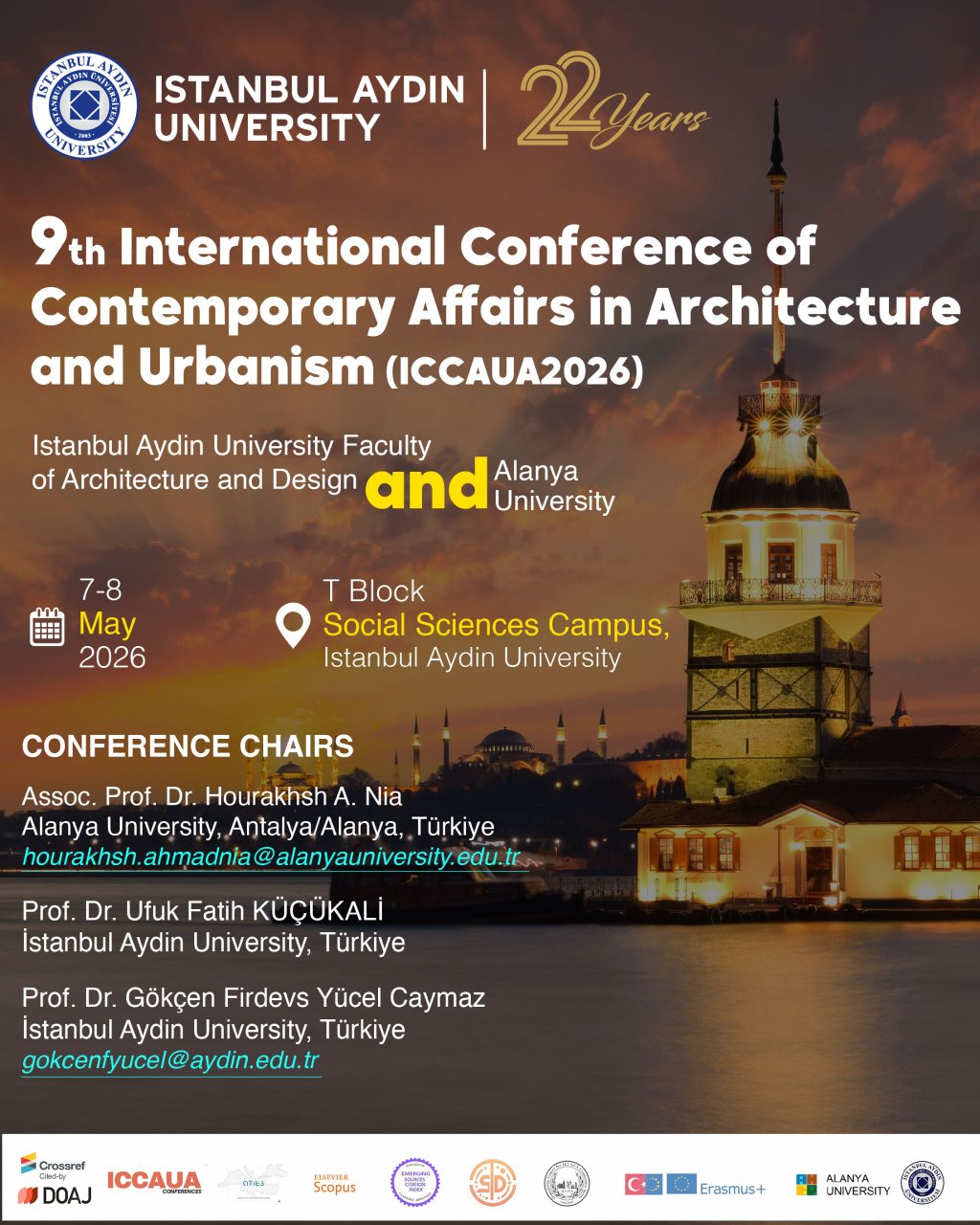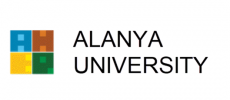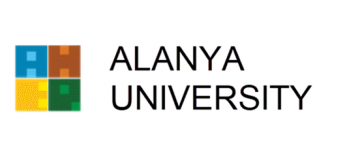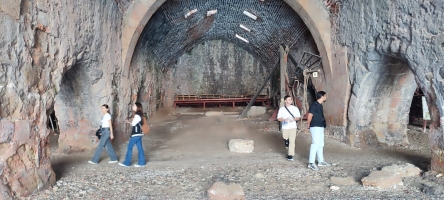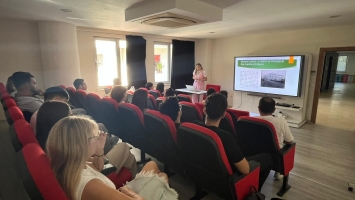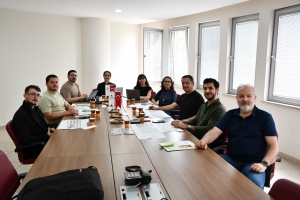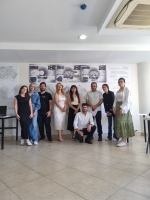The first event of the Alternative Architect(ure)s Series, organized for students and graduates of the Department of Architecture, was held with the participation of Architect and Real Estate Appraise...
ICCAUA2026
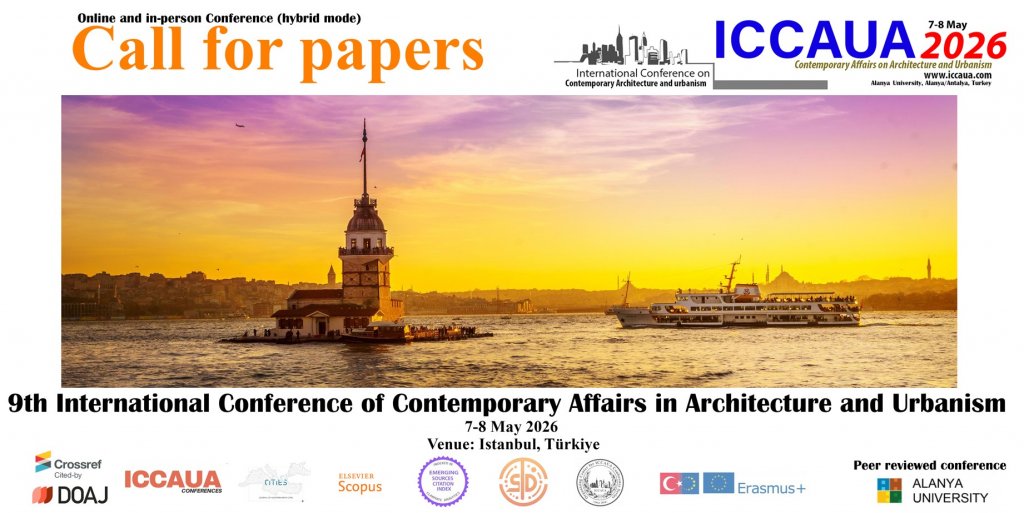
🌍 9th International Conference of Contemporary Affairs in Architecture and Urbanism
🏛️ Istanbul, TÜRKİYE 🗓️ Date: 7-8 May 2026 ✒️ Abstract Submission Deadline: 7 December 2025
🔗 Website: www.iccaua.com
(Hybrid Conference: both in-person and online paper presentations will be available.)
The 9th International Conference of Contemporary Affairs in Architecture and Urbanism (ICCAUA2026) will be jointly organised by Alanya University and Istanbul Aydın University. ICCAUA2026 will feature both in-person and online sessions, bringing together theories, manifestos, and methodologies on contemporary architecture and urban spaces to deepen the understanding of the future of architecture and urban planning. The conference aims to build a bridge between theory and practice in the built environment by presenting the latest research findings, innovative approaches, and methodologies for creating, assessing, and understanding contemporary built environments.
The scope of the conference includes peer-reviewed original research articles, case studies, technical reports, reviews, analyses, short communications, and notes to the editor. Scholars, practitioners, professionals, researchers, and policymakers across disciplines—including Architecture, Urban Design, Urban Planning, Landscape Architecture, Civil Engineering, and Art—are welcome to contribute. The conference will only publish research of the highest quality and impact.
- Submit your abstracts to: iccaua@alanyauniversity.edu.tr
- Important Note: To expedite the review process, please submit your abstract as a .docx Word file, strictly following the format, structure, and guidelines provided in the above-mentioned templates. Please first submit only your abstract. If accepted, you will receive a manuscript number and a preliminary acceptance letter, after which you may register and then submit your full paper. Please note that after you receive your manuscript number, you will need to mention your manuscript number and the title of your manuscript in all your future communication. Emails that do not include the relevant manuscript number and title may cause delays, confusion, or may remain unanswered.
The primary themes (sections) and their sub-sections for the conference are:
A: Architecture and Technology
Sub-Sessions:
Environmental Sustainability
Smart Buildings
Smart Skin, envelope, Building facade
Green Architecture and Urban Planning
Climate and building
Climate Change Adaptation
Interior Architecture
Architectural History and Theory
Architectural Planning and Design
Sustainable Environmental Design and Technology
Biophilic Architecture
Kids and Architecture
Design and Technology of Construction
Computers in Architecture
Energy Conservation
Solar design
Genius loci
Education
Artificial Intelligent (AI)
Internet of Things (IoT)
Blockchain Technology
Building Information Modelling
Augmented Reality (AR) and Virtual Reality (VR)
Space and Place Studies
Phenomenology
B: Sustainability and Urban Design
Sub-Sessions:
Landscape Architecture and Urbanism
Sustainable Urban Development
Smart City, Digital Age, AI
Urban ecology
Urban Microclimate Analysis
Housing and Urban Environments
Urban Aesthetics
New Urbanism
Urban Transportation: Planning, management, and Strategies
Disaster Risk Management
Urban Sprawl
Moral and Ethical Implications in Urban Evolution
Obedience and Responsibility in Urban Expansion
Healthy and Productive Economy
Chemicals, Waste and Air Quality
The Urban and Architectural Philosophy
Landscape
Social and behavioural studies
Public Places Urban Spaces
C: Heritage and Cultural Landscapes
Sub-Sessions:
-Revitalization
- Gentrification
-Cultural studies
-Adaptive reuse
- Regeneration and Urban Renewal
-Morphology
-Urban Identity, Authenticity
-Tourism Management Perspectives
-Archaeology, Reconstruction and Restoration
-Conservation
-Computer and Digital Applications
-Space and Place Studies
-Intangible heritage
-Cultural Heritage and Smart Preservation Technologies
D: Habitat Studies / Infra Habitation
Sub-Sessions:
-Infra Habitation
-Emerging cities
-Gated communities
- Conflict and divided territories.
- Slums
-Affordable houses.
- Resilience, Disaster and Conflicts
-Pandemic and disease management
-Vernacular studies
-Agricultural Studies
-Housing Studies
- Housing in Egypt
-Demographic studies
-Rural Studies
E: Urban Economics: Studies/Policies/Challenges
Sub-Sessions:
- Socioeconomic Inequality and Urban Informal Economies
- Urban Regeneration and Economic Revitalization
- Public Spaces and Economic Development
- Smart Cities and Economic Competitiveness
- Urban Design and Sustainable Economic Growth
- Historic Preservation and Economic Resilience
- Urban Transportation and Infrastructure Economics
- Urban Tourism, Cultural, and Creative Economies
- Digital and Innovation Economies in Urban Contexts
- Economic Impacts of Urban Migration and Demographic Changes
- Circular Economy and Sustainable Urban Finance
- Climate Change, Urban Resilience, and Economic Adaptation
- Urbanization, Economic Transformation, and Globalization
- Real Estate, Housing Markets, and Urban Policy
- Urban Governance, Policy, and Investment Strategies
F: Salutogenic Architecture
Sub-Sessions:
-Public Health
-Beyond health Architecture
-Visual Comfort
-Well-being in architecture and built environment.
-Quality of Life
-Healing Environment
-Aesthetic Design and Health
-sustainable acoustic design system
-Thermal comfort
-Comprehensibility in architecture
-Indoor air quality
-Manageability in architecture
-Meaningfulness in architecture
-Sick Buildings
G: Civil Engineering
Sub-Sessions:
- Theoretical and Advanced Technology of Engineering Structures
- High-rise Buildings and Large-span Structures
- Bridge and Tunnel Engineering
- Newer Structures and Special Structures
- Engineering Structure Safety and Disaster Prevention
- Structural Reliability, Durability and Health Monitoring
- Project and Construction Processes
- Educational Topics in Civil Engineering
- Reuse and Recycle Wastewater
- Traffic Engineering
- Geographic Information Systems (GISs)
-Construction Management Engineering
